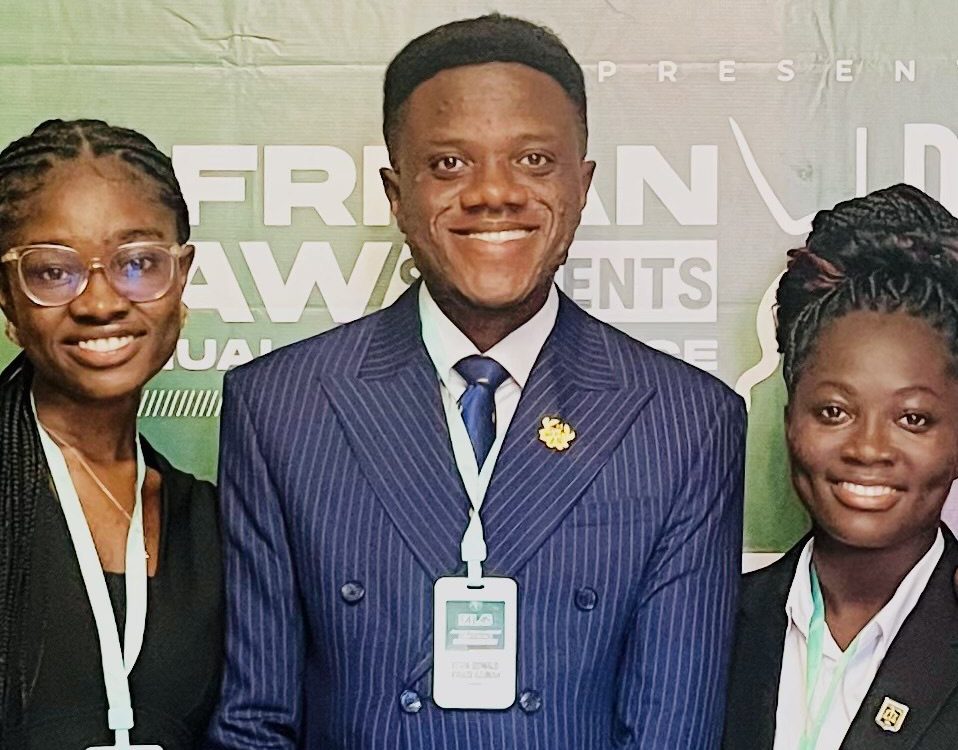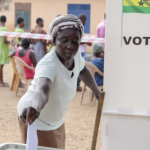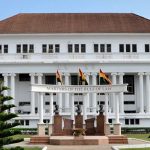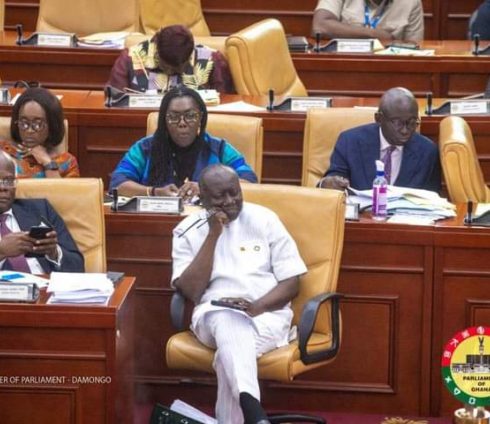Putting African Judicial Independence under scrutiny & Reflections from Dar Es Salaam
2024 FALAS annual conference
“We are flying at twenty-nine thousand feet and the pilot has turned off the fasten seatbelt sign. You’re now free to move about the cabin.”
As I was cruising in the atmosphere aboard the Airbus vehicle destined for Addis Ababa for a transit to Dar es Salaam, I reminisced about how far-fetched it seemed when I discussed with my brother Benjamin Alpha Aidoo two months prior about the possibility-or properly phrased, the impossibility of attending the 2024 FALAS annual conference in the Tanzanian city of East Africa.
But as the Ethiopian Airliner ET920 departed the tarmac at Kotoka and blasted off the runway into the skies, I knew that this was not the culmination of a long and hard-fought summer, it was the beginning of greater heights.
Law students across the continent were converging in Dar Es Salaam, Tanzania under the auspices of the Federation of African Law Students (FALAS) for the 4th Annual Conference of the association. As a young Pan-African and a lover of the law, peer discussions and comparative analysis, my interest was piqued and through grace, time and chance alone, I was one of the Ghanaian delegates going to grace the occasion.
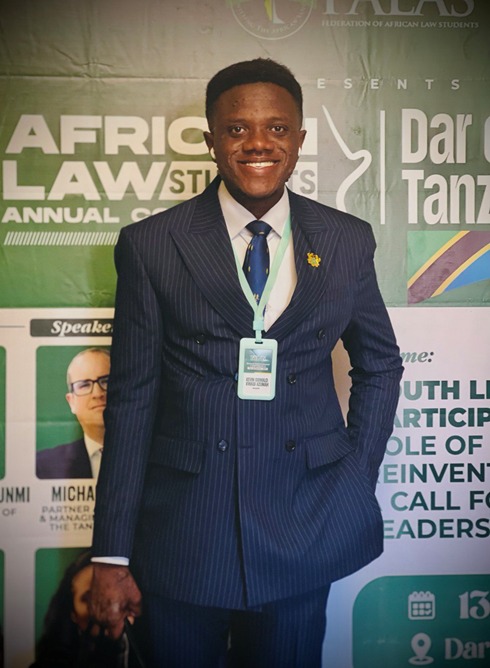
It was not my first time outside Ghana but it was definitely my first time outside the West African subregion. I had so many expectations: the cultural shock ‘boggas’ speak about, including the different dishes and being a picky eater even in my native Ghana, I was looking forward to what to expect from a different part of the continent. But most of all, I was eager to know what law meant to other African compatriots and whether rule of law was observed on a continental level as we did or at the very least attempt or pretend to observe in Kwame Nkrumah’s Ghana.
I was also keen to know what African unity meant to other Africans, having only had such discussions with Ghanaians, most of us influenced by the writings of the forebearer of the idea, Dr. Nkrumah, Ghana’s first president. After six days in Tanzania one of which was spent outside mainland Africa on the semi-autonomous region of the Island of Zanzibar, I had my answers, some of it, I should say and for some, more questions rather than answers. But it was a rewarding week.
You will soon find out.
Firstly, we need to step up in Ghana because all the noise about Kotoka Terminal 3 seem so unnecessary and fueled by some mediocre mentality in the face of Addis Ababa Bole Airport. The structure there makes the entire Accra International Airport seem like a local airstrip and I wonder why the noise instead of tightening our boots to catch up. After some two hours of waiting, we boarded the next flight.
We arrived in Dar es Salaam on Sunday morning after departing Accra at noon the previous day. I pretty sad I had lost three hours—those geography lessons in Junior High made practical sense now. Still, where did those three hours go and how am I going to account for them? [Laughs]. At sundown, I’d hoped to see the East African sun setting on the Indian Ocean but it was not to be as the location of the hotel meant the sun set on the other side. I would have to wait to see that beautiful view I always read about. The travel was exhausting and so I could not wait to turn in and so Day One—arrival of delegates was about that, of course skipping the 1million photos at the beach.
MEETING JUSTICE TUJILANE OF THE AFRICAN HUMAN RIGHTS COURT: COMPARATIVE STUDIES ON JUDICIAL INDEPENDENCE ON OUR CONTINENT
My next highlight of the week happened on Day Two. Judge Tujilane Rose Chizumila of the African Court on Human and People’s Rights had a session with us and her stories were just captivating. I could listen to her for an eternity and it may not be enough. Her Ladyship’s appreciation of her journey as a child refugee in Tanzania and her subsequent troubles when she returned home to Malawi leaves much to be desired of Africa but it is her resilience through all of that to become the first female law firm owner in her country that won my heart—that about going against the odds, Judge Tujilane, these are the real heroes!
Her Ladyship engaged delegates on African democracies and the independence of the judiciary. She spoke about the appointment of adjudicators by presidents and how to wane the perception of bias towards the executive from the bench. I could not let that discussion slip without engaging her on a research by one of my professors back in Ghana, Raymond Atuguba, the Dean of University of Ghana School of Law.
Prof. Atuguba’s studies had found that most often than not, Ghana’s Supreme Court Justices vote in favour of the regime that appointed them on contentious matters before the constitutional court. The research was not well-received by the justices, some of whom were present when the academic presented his findings.
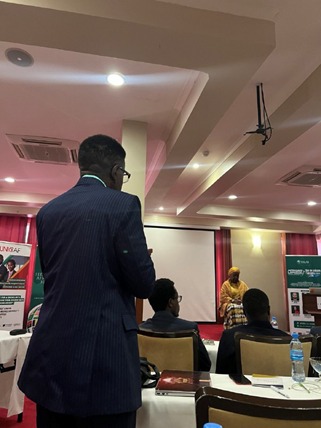
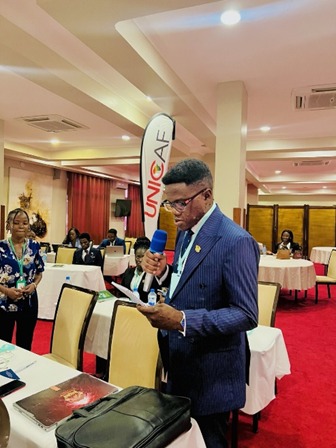
Justice Tujilane in response to my engagement, urged judges to free themselves of such perceptions of bias by writing their own opinions and to make such judgments well research and “airtight” that scholars or review benches would have a tough time “tearing it apart”. I am convinced on this approach, giving that it has been observed by rather renowned Ghanaian jurists that most decisions that arise from the apex court these days lack individual opinions of the judges who often than not rather concur or agree without saying more.
Without prejudice to Her Ladyship’s engagement with us which was of top quality, I must say the peak of our interaction with her was her connection to her Africaness, as she would not allow us call her by her English name Rose, but only by her native Tujilane which means one who is loved.
Judicial Independence in Tanzania
Closely knit to the highlights of the interaction with the judge is our experience at Kampala International University, Tanzania. On Day Five of the conference we visited the university and were hosted by the Law faculty and student leadership. The delegation was privileged to benefit from a crunch course on Tanzanian Legal System by the benevolence of Dr. Lugaziya. We learned that the semi-autonomous region of Zanzibar had its own rules which were only subject to the Court of Appeal of Tanzania, the highest court.
But most striking of all was a feature of their legal system which all my studies in the law would lead me to conclude is an affront to rule of law, the Chief Justice of Tanzania has no security of tenure. He could be dismissed at any time from the position. The chief judge however has security of office as a judge.
When I inquired from the lecturer on the rationale behind this Constitutional arrangement, he shared in my fears of abuse and excesses but assured that the Chief Justice has never been dismissed by the President which may be influential in activism being low or nonexistent to change the law.
I still maintain this law be changed.
The removal from office of a Chief Justice is a major event in a democracy and cannot and should not be done willy-nilly manner and the Supreme Court of Ghana, speaking through Date-Bah JSC, confirmed this in Agyei-Twum v Attorney General [2005-2006] SCGLR 732.
READ: Of Lower Courts & Superior Courts: Contempt of Court. Ex-Parté Owusu Review
A tour of the East African country & reflections on Africa
Dar es Salaam seemed to me as a city undergoing rapid transformation. There are roads under construction in almost every part of the city which leaves one wondering the beauty its transport system will be in years to come.
But that was far from one of the reasons for being there. It was time to try some Tanzanian street food. A couple of colleagues and myself, after official activities on Day Three, found our way to the National Museum and after departing there made a stop at a local food joint where we thrilled ourselves to some delicacy called Zanzibar pizza. It some pastry with so much fillings and a chili sauce sprinkled on it.
You just have to taste it! We then turned to the meat sellers and enjoyed some mbooze [mbu-zey] which is a specially grilled goat with some local spices, the combination of the mbooze, the Zanzibar pizza and some sugarcane juice freshly made for us with some other ingredients just made leaving the streets more difficult.
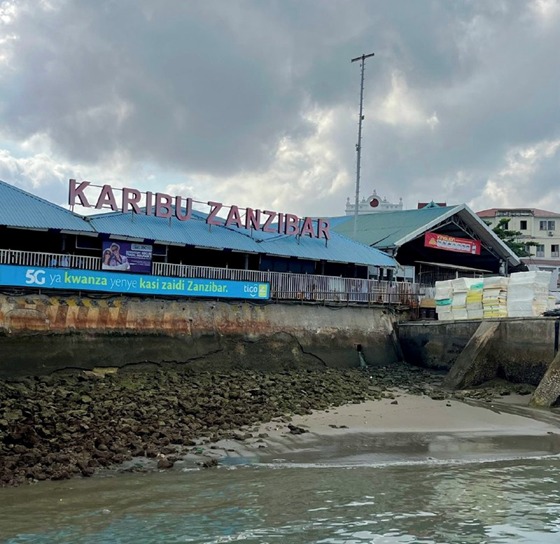
But let me tell you about Zanzibar.
Nakupenda malaika
Ningekuoa mali we
Ningekuoa dada
Nashindwa na mali sina we
Ningekuoa malaika
Nashindwa na mali sina we
Ningekuoa malaika
The voice of our captain who rowed us to Nakupenda, a smaller isle which was part of the Zanzibar territory still plays in my head. After bringing us back to the main shore, the young man gave us a treat to his melodies before we disembarked the canoe.
Further Reflections
The ancient architecture; the beautiful palm decorated streets; the cunning street traders who preferred the US Dollar to the local currency; the Europeans who made great conversations and the starkly neat waters makes Zanzibar a must, there is few words to say it without diminishing the experience, you just have to be there.
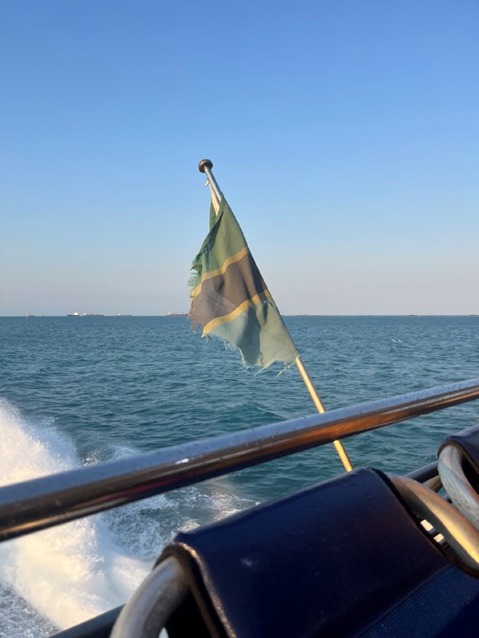
Most of all, I am thankful I did not get seasick on the ferry ride back to Dar es Salaam as did most newbies on board. Had that happened, I could not have captured the beautiful East African Sunset.
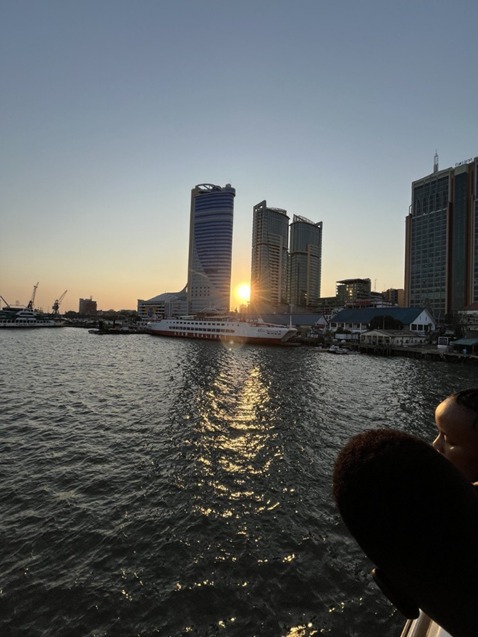
I traded with a man who spoke no English, only Swahili, but I spoke no Swahili, only English—the power of commerce. [Giggles]
I saw the beautiful Dar es Salaam Bridge which has no equal in Ghana.
Their maintenance of right hand drive always confused me when we got on the road.
But I felt at home. Not a day did I feel I was so far from Ghana because the truth is I was home, Africa is my home and I was in Africa.
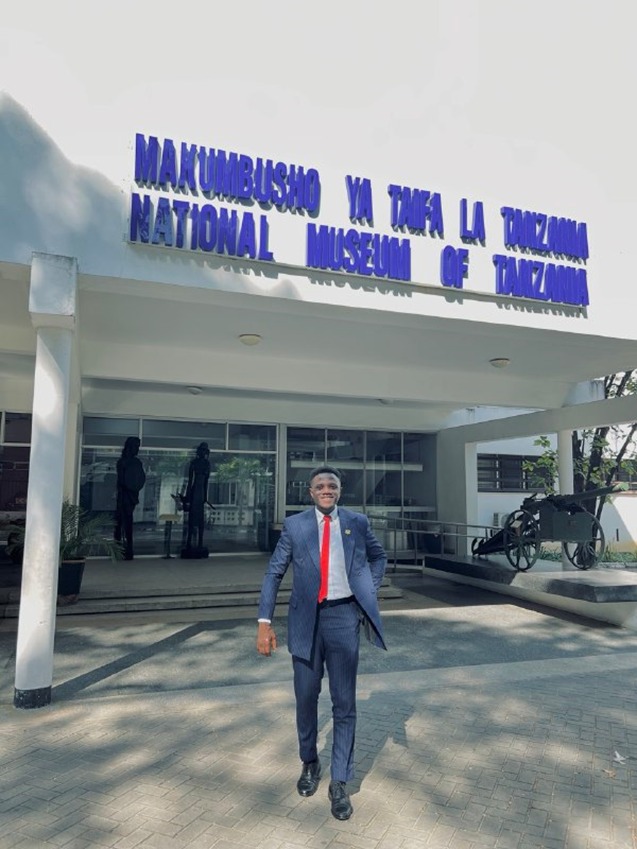
“Unity, and “One Africa” was chanted at the conference more times than I can remember. I heard names like Aggrey, from South Sudan and Asiome from Kenya both names indigenous to Ghana which makes you wonder…
Most fulfilling, I saw Nkrumah Street, a eulogy to the African giant from Ghana.

These memories occupied my mind when the pilot interrupted my thoughts: We have started our descent and will touch down in about 20 minutes at Kotoka around 11:05 am the local temperature is 29 degree Celsius.
I was back in Ghana but I never left home because Osagyefo’s words made practical sense now “the forces that unite us are greater than the superimposed influences that keep us apart.”
Africa Must Unite!


